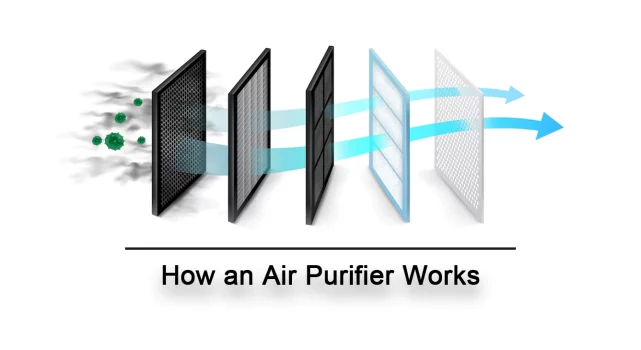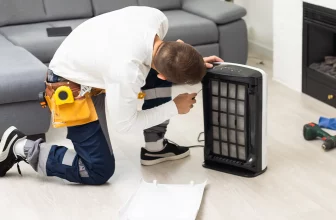A Device that sanitizes the closed air of the house is called a purifier. If we go into detail, removing the pollutants, killing the germs, clean the harmful gases from the air are basically called air purifiers. Let’s try to learn HOW AIR PURIFIERS WORK.
An air purifier is a portable device inbuilt with an internal filter and fan to pull unwanted particles from the air in a specific room. Its particular sensors detect the air quality and then automatically purify the air and circulate it back into the room. This process repeats continuously as per the air quality and freshens the room’s atmosphere.
Air purifiers are different from regular air filters because an air filter filters the dust from the air, but an air purifier sanitizes the air. Air purifiers sanitize and help eliminate pollutants, allergens, and toxins.
The air purifier has one or more filters in various styles and for various works and particles. This mechanism suckers the air and captures and neutralizes pollutants and particles as air passes over them before recirculating the clean air into the living space.
Material
HEPA filters are typically made of borosilicate glass or plastic fibers. In contrast, these filters are typically made of paper, fiberglass, or mesh. They are capable of removing the vast majority of polluting particles. The type of particles captured is determined by the filter used. Filters capture large, coarse molecules like dust mites and pollen (below 5 microns).
But when it comes to the smallest particles, as small as 2.5, High-efficiency filters are used to deal with them. A profound network of fibers and denser layers of intricate weaves remove pollutants and allergens. In this modern time, most of the best AIR PURIFIERS have ultraviolet filters and use UV light to destroy biological impurities such as mold and bacteria. In contrast, those with dedicated activated charcoal filters remove gases like volatile organic compounds (VOCs) and smoke particles.
Type of Filter
Common air purifier filters generally include pre-filters, activated carbon filters, ionic air filters, HEPA filter types, UV light air filter types, electrostatic filters, TiO2 filters, pleated filters, washable filters, and so on. Some have dual and triple filters, while others have all of the effective filters and provide the best performance. Our experts compiled a list of the best air purifiers in India to assist you in your search.
What is the difference between ionic and HEPA air purifiers?
In simple words, ionic purifiers use electricity to clean the air, whereas HEPA air purifiers are made of filter layers.
Both have price and functionality differences. A Hepa filter is far more effective than and far superior to an Ionic filter. Ionic air purifiers go by several names, including “ion air purifiers,” “negative ion air purifiers,” and “air ionizers.” Air purifiers with an ionizer or an ionic air purifier generate negative ions. These charged ions cling to allergens and irritants in the air, such as dust, pollen, pet dander, and other irritants. This ionic air purifier removes PM2.5 and formaldehyde in less than a minute. This charges the particles, causing them to stick together and grow larger and heavier, causing them to settle faster and the rest of the smallest to become inhalable.
Why do we need an air purifier?
The particles that our naked eye cannot see are hazardous. They may occur in offices, cabins, homes, and any closed area. We need an air purifier that automatically detects those particles and gases and provides clean and fresh air while avoiding air illness. When we inhale harmful gases and dangerous particles, it causes serious health issues to the lungs. It disturbs the respiratory system, which is why it can occur chest congestion, eye problems, rhinitis, and so on. We believe that PREVENTION IS BETTER THAN CURE, and that’s why we need air purifiers, especially if we live in metropolitan cities, industrial areas, and developing are because these are the most common places where it occurs.
FAQ
Can air purifiers be placed in a heated room?
In a nutshell, no! It would help if you did not place your air purifier in a heated room because it is an electronic device that requires an even temperature like other machines and devices. More importantly, keep your device away from vents or radiators to avoid overheating and potential damage.







